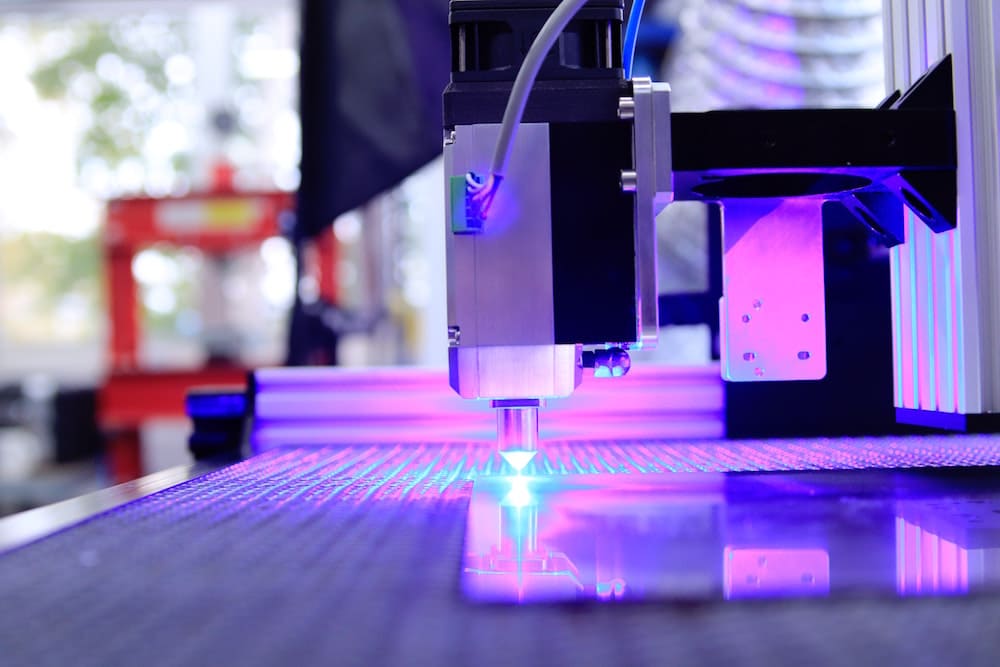One of the best things about laser cutting machines is that they are amazingly versatile. Since a laser beam can’t warp or contaminate materials like a physical blade can, laser cutters can safely be used on almost anything. They can even be used on delicate human eye tissue for vision correction surgery! However, the high heat levels created by laser cutting can release dangerous chemicals into the air. Eventually, this can have harmful effects on you and your employees. Practice basic laser cutter safety by avoiding the following materials.
HDPE (“Milk Bottle” Plastic)
HDPE or High Density Polyethylene is an extremely versatile thermoplastic polymer, used in almost everything from milk jugs and shampoo bottles to bleach bottles, cutting boards, and piping. However, since HDPE is made from petroleum, it is highly flammable, and can release toxic fumes as it is treated with high temperatures. Not only is it hazardous to try to laser-cut HDPE, it can also be a very frustrating experience—in layman’s terms, whatever you are trying to cut will all turn into a big, gooey mess! If you would like to create something with a similar weight and texture to HDPE, extruded acrylic is much safer to cut and has a smoother, neater finish.
PVC (Polyvinyl Chloride)
Most people are familiar with PVC due to the proliferation of PVC piping commonly used in plumbing. “PVC” stands for Polyvinyl Chloride, and it’s the “Chloride” part that causes issues. When PVC is cut with a laser, it will release chlorine gas, which is harmful to both humans and machinery. For humans, chlorine gas exposure will cause coughing, shortness of breath, and possibly even lung damage. And even if operators are wearing protective breathing equipment, the gas can ruin the optics and motion-control system of the laser cutter, and corrode any metal components as well. If you find yourself needing to cut PVC, you’re better off using a regular old electric saw.
Polycarbonate (“Plexiglass”)
Both Plexiglass and Lexan are brand names for polycarbonate, an extremely durable material. It is used in everything from football helmets, to car windshields, to bullet-resistant bank teller windows. As you might guess, that’s because it’s extremely impact-resistant! Studies have found that polycarbonate is 250 times more impact-resistant than glass. It is also capable of withstanding extreme heat, acids, and chemicals such as gasoline.
Polycarbonate is so durable that it’s even used in the safety window of laser cutting machines! That’s because it is able to rapidly absorb infrared radiation, the light frequency that laser cutters use to cut materials. If you try to cut it with a laser cutter, you will likely only succeed in turning the edges black. Once again, a real metal saw is the best tool for this particular job.
ABS Plastic (Legos plastic)
We have all (well, most of us) felt the pain of stepping on a Lego—to the extent that “I hope you step on a Lego” has become a modern curse. Lego owes its infamous durability to the chemical makeup of its base material, ABS, or Acrylonitrile Butadiene Styrene. ABS is another incredibly durable, impact-resistant thermoplastic. That’s why it’s typically used in things which we don’t want to break, like computer parts, medical supplies, and protective headgear.
ABS is also very easy to melt, making it a popular material for DIY plastic molding and 3D printing. However, for all its useful properties, ABS doesn’t perform well under a laser cutter.
The plastic tends to melt, rather than vaporize, leaving melty, gooey deposits on the cutting grid rather than a nice clean cut. To top it off, ABS is also highly flammable, and when it ignites, it releases hydrogen cyanide, a cancer-causing agent found in cigarettes. While there is still some debate about the dangers of running ABS material though a laser cutter, we say that, for now, it’s best to err on the side of caution.
Looking for a Laser Cutting Machine in Richmond VA?
Laser technology can bring unparalleled precision and safety to your factory, plant, or home workspace. Are you a small business owner looking for laser cutting or laser coding machines in Richmond? Be sure to stop by SSI Packaging today! In fact, we can provide pretty much any small business solution you might need. From boxes and packaging foam, to marking and coding equipment, we have it all. Just let us know what you need, and our friendly service technicians will be happy to lend you their expertise!

